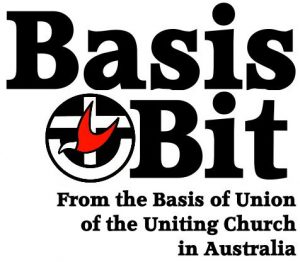1 September – Return
Pentecost 12
1/9/2019
Hosea 14
Psalm 89
Luke 14:7-11
In a sentence:
Grace can only be given into empty hands
‘Sin’ the church’s four-letter word.
Four-lettered words are ‘sharp’ words. We call them ‘swear’ words because of the way we use them to intensify an oath – a promise or a threat. Just as four-letter words which actually have four letters are real words referring to real things and yet most of the time are the wrong way to refer to those things, short-and-sharp ‘sin’ both marks something we know to be real but which often feels overstated. It’s uttered all over the place in the church but often with the wrong emphasis: it is not the place to start in characterising the human being in her relationship to God.
Of course, it’s a very biblical word but we hear it in tune with the way in which it has been taken up in the church through history. It ought not surprise us that people so capable of sin as Israel and the church might not be quite capable of speaking of sin properly.
The prophets, of course, are full of the accusation of sin, and we’ve heard plenty of that from Hosea over the last couple of months. His account and assessment of the wrong in Israel has been visceral. It is hard not to be overwhelmed by the sheer weight of sin in the prophets.
Of course, the word of grace has been present alongside judgement of sin, and Hosea finishes with God’s willingness to reconcile – our text for this morning. This final chapter is structured as a confession and absolution: there is the call to Israel to ‘return’, the confession of Israel, and then God’s declaration of what good will now come to Israel. That good we have heard most weeks over the series as part of our own declaration of forgiveness in the liturgy:
4 I will heal their disloyalty;
I will love them freely,
for my anger has turned from them.
5 I will be like the dew to Israel;
he shall blossom like the lily,
he shall strike root like the forests of Lebanon.
6 His shoots shall spread out;
his beauty shall be like the olive tree…
7 They shall again live beneath my shadow,
they shall flourish as a garden…
This final chapter presents, on the surface at least, the ‘standard’ approach to sin, confession and absolution in the churches: you are sinners (swear word), therefore you need to confess (also a swear word), and then God forgives (resolution). I say ‘standard approach in the churches’ because, in fact, this is not quite how things unfold in the prophets or in true Christian experience.
Grace is not conditional. It must be received to be recognised as grace, but it always precedes our reception and recognition. The very possibility of a return by Israel has its basis not in the repentant heart of the people but in God’s invitation to them: ‘Return’ (14.1).
Earlier in Hosea we read,
Their deeds do not permit them
to return to their God.
For the spirit of whoredom is within them,
and they do not know the Lord. (5.4)
Later, when Israel says to itself, ‘Let us return to the Lord,’ God’s response is ‘Seriously? What shall I do with you? I look for love and knowledge, not religious obeisance’ (6.1-6).
The engine which moves the story from judgement to restoration is grace, and not the perceived need on Israel’s part for something better. The people cannot return until it hears God’s invitation: ‘Return’. ‘Return’ is an invitation to claim the promise God makes in the face of all that has come to pass: I will heal, I will love, I will be like the dew; and you shall flourish as a garden.
To claim these promises is to let go of other things claimed. And so Israel’s confession includes, ‘We will say no more, “our God”, to the works of our hands.’ In its immediate context this is a casting away of wooden and metal idols (4.12; cf. 4.17; 8.6; 10.6; 11.2; 13.2; 14.8). But the prophets’ easy mockery of the worship of wood and stone disguises a deeper truth: there is nothing we can make or do which will bring us into God’s favour. The ‘work of our hands’ is not merely the silver statue of a god; it as much anything we imagine will impress God, will allow us to approach God, will place God within our reach; this includes even our willingness to confess as a kind of ‘offering’ to win God over (such as seems to be proposed in 6.1-3).
For Israel ‘the works of our hands’ were not only the religious idols but also the land, the kingship, the divinely-commanded religious obligations, even the half-thought of turning back to God – whatever Israel counted as for its own good. For us, it is the same kind of thing: moral achievement, reputation, continuity of history, correctness of theology or purity of association. What we most love and cling to, or create to keep at bay the threats we most fear – these become the works of our hands, with the strong temptation to identify them as ‘our God’. The principle ‘God is what God does’ morphs into ‘God is what we do’.
God has a great interest in what we love and fear, but not as the basis for our relationship with God. For us, what we most love and most fear form a bulwark against the world, against each other and, finally, against God. It is their potential to secure us in this way that causes the works of our hands to begin to look like divine things. Just this saw Israel lose the plot: the God who called them into being as a people is just not doing enough to secure what we love and keep fear at bay, and so let’s try other gods, run off to arrange political alliances, develop new liturgies and more convenient moralities, focus on the ‘important’ people and let the rest fend for themselves.
We fear that if we do not, ‘with our hands,’ create for ourselves parents to keep us safe, we will be but orphans. But the confession on the lips of Israel this morning concludes by letting go of this anxiety: ‘in you, Lord, the orphan finds mercy’ (14.3), in you is mother, father, for you lift us to your cheek.
‘Return, O Israel, for you have stumbled… ‘Return’ is the sharp word intended to catch our attention in Hosea, not the four-lettered accusation, ‘sin’, or the stumbling. The sharpness is not dark pointedness of profanity but the stinging light which reveals a path back to God. An orphan cannot un-orphan herself; love and care cannot be forced from another. But this was never the requirement: ‘your faithfulness comes from me’.
The command to ‘return’ declares that we never were orphans, despite how things felt.
And so, however things feel for us now – whether pretty bad or, perhaps especially, if they are feeling pretty good – Return, and say no longer ‘my God’ to the works of your hands. ‘For I desire not your works, your sacrifices and burnt offerings, but love and the knowledge of God’ (6.6).
What we make of ourselves and the world is not unimportant but must not get in the way.
God has already embraced us, and we cannot ‘return’ that embrace if our arms are already full. Grace can be given only into empty hands.



